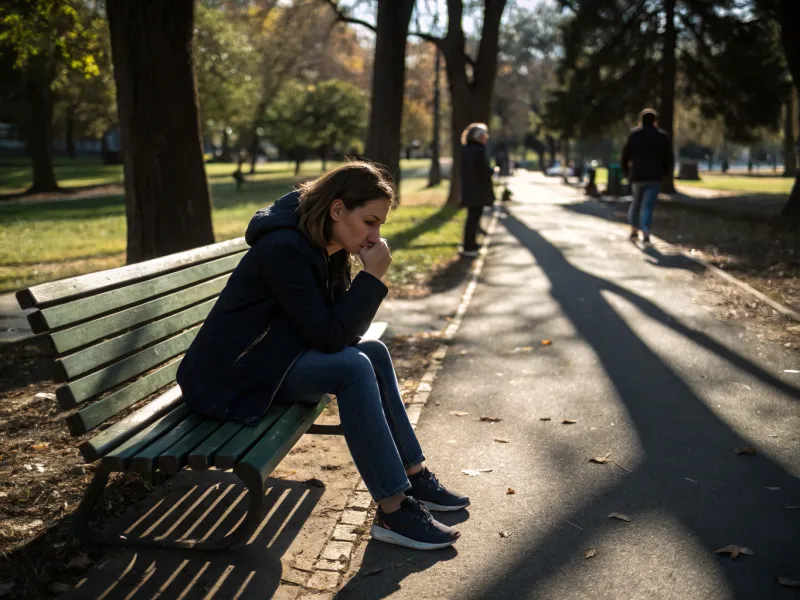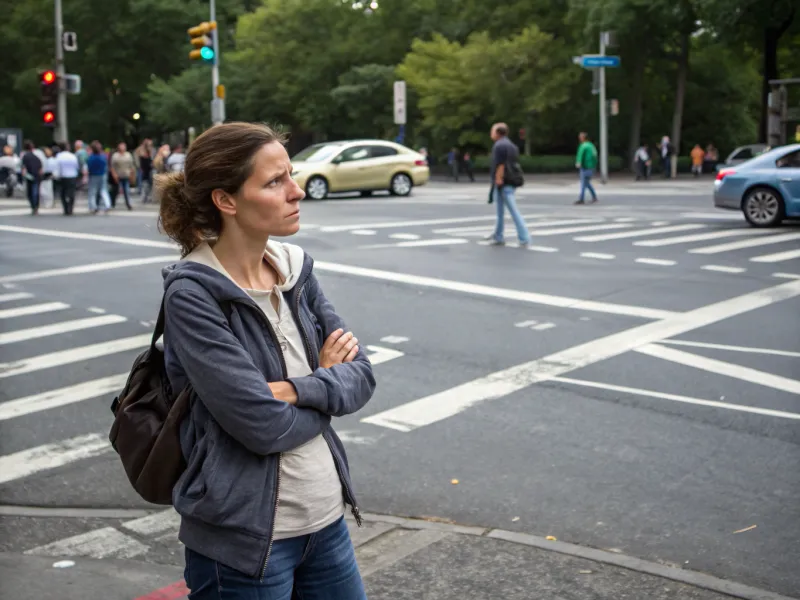32 Clear Signs You’re Experiencing Trauma After a Toxic Relationship
You may have left the relationship—but the relationship hasn’t left you. Toxic love leaves wounds you can’t always see: emotional flashbacks, self-doubt, and triggers that seem to come out of nowhere.
Trauma doesn’t always look like screaming or panic attacks. Sometimes it’s silence. Exhaustion. Overthinking. Sometimes, it’s wondering why you don’t feel safe in your own skin.
If you’ve been through emotional manipulation, gaslighting, narcissistic abuse, or long-term control, here are 32 signs you might still be experiencing trauma from a toxic relationship—so you can name it, understand it, and begin to heal.
1. Constantly second-guessing yourself

You second-guess yourself constantly—even about small things. Toxic love trained you to doubt your own intuition. It’s as if every decision is a test, and failing feels catastrophic. Your inner voice, once a gentle guide, now feels like a harsh critic.
Nothing seems straightforward, and you’re left feeling like you’re walking through fog, unsure of where to step. You want to trust yourself, but the shadows of doubt loom large, making even mundane choices feel monumental. It’s exhausting, really, and you wonder if you’ll ever regain the certainty you once had.
2. Feeling emotionally numb or disconnected

You feel emotionally numb or disconnected from yourself. It’s a defense mechanism. You went into survival mode. Imagine trying to feel joy or sadness, but there’s just… nothing. A void where emotions used to reside. It’s like watching your life play out from a distance, unable to fully engage or care.
The world moves around you, vibrant and alive, yet you’re stuck in grayscale, struggling to connect with the person you once were. This emotional armor served you once, but now it weighs heavy, keeping you from the richness of life.
3. Replaying past arguments

You replay past arguments in your head—on a loop. Trying to “make sense” of the senseless is a trauma response. Late nights become battlegrounds where you fight old wars, dissecting every word, every pause, reimagining different outcomes.
Sleep doesn’t come easy when your mind is a theater playing the same chaotic scene over and over. You crave understanding or maybe closure, but instead, you’re left tangled in a web of ‘what ifs’ and ‘if onlys.’ Each replay digs a deeper groove into your mental landscape, making escape feel impossible.
4. Guilt for leaving

You feel guilt for leaving—even though you were mistreated. That’s not love. That’s conditioning. You left to find peace, yet the echoes of the past linger, whispering doubts and fears. You question your actions, wondering if you did enough, if you could have tried harder.
The guilt is a heavy cloak, reminding you of promises broken, even if they were never yours to keep. It’s a tangled web of responsibility misplaced, where your freedom feels like betrayal, and moving forward feels like desertion. But deep down, you know you deserve to reclaim your life.
5. Flinching at kindness

You flinch at kindness or healthy behavior. Because it feels unfamiliar. Unsafe, even. When someone offers genuine care, your instinct is to recoil, waiting for the hidden catch or the sting that never comes. Kind words and gestures, once comforting, now feel like traps.
It’s unnerving, this inability to trust the good, to accept warmth without suspicion. You long to relax into kindness, to bathe in its sincerity, but the shadows of past betrayals loom large, making every gentle touch a potential threat. Healing means learning to embrace love without fear.
6. Struggling to believe others care

You struggle to believe anyone truly cares about you. Toxic love taught you love had strings. Every compliment comes with a hidden agenda, every hug hides a motive. It’s hard to accept genuine affection when your past is littered with conditional love.
You sit among friends, laughter swirling around, yet feel like an outsider, isolated by mistrust. Their care seems like a performance, and you’re waiting for the curtains to fall. It’s a lonely existence, yearning for connection but trapped by skepticism. Trust, once shattered, takes time to rebuild.
7. Fear of being “too much”

You have a fear of being “too much” or “not enough.” Because you were criticized no matter what you did. In a world where you once contorted to fit someone else’s mold, your identity now hangs in the balance. You’re careful with your words, your actions, terrified of tipping the scales.
The fear is a constant companion, whispering insecurities with every step. Am I talking too loud? Too quiet? Too needy? It’s a relentless questioning of your worth, a balancing act where you never seem to measure up. Yet, beneath this fear, lies a yearning for authenticity.
8. Walking on eggshells

You feel like you’re “walking on eggshells” in new relationships. Even when no one is hurting you anymore. Every move is calculated, every word weighed, in fear of triggering a storm that doesn’t exist. It’s exhausting, this hyper-awareness, where you’re bracing for impact in a serene world.
Relationships, meant to nurture and comfort, now feel like tightropes, where balance is key to survival. You long to breathe easy, to shed the mantle of caution, but trust is a fragile thing, rebuilt one careful step at a time.
9. Confusing shame

You carry a deep, confusing shame. You blame yourself for not seeing it sooner—or for staying too long. Shame, a shadowy specter, clings to your being, whispering deceitful tales of failure and regret. It wraps around you, masking the truth with its heavy veil. You’re left questioning your judgment, your strength, your very essence.
How did you let it happen? Why didn’t you leave? These questions echo in your mind, each one a reminder of perceived inadequacies. Yet, beneath this shame lies a quiet truth—you’re human, and you deserve compassion.
10. Intense emotional reactions

You have intense emotional reactions to things others shrug off. Those “overreactions”? They’re trauma triggers. What seems trivial to others can unleash a torrent of emotions within you, a storm that leaves you shaken and bewildered. It’s as if your emotions exist on a knife’s edge, ready to tip at the slightest provocation.
The world feels unpredictable, a minefield of potential triggers. You long to control these responses, to navigate life with calm composure, but your past has left a raw nerve exposed, vulnerable to the smallest nudge. Healing means learning to understand and soothe these wounds.
11. Over-explaining everything

You over-explain everything—to avoid being misunderstood. Because you were made to feel “wrong” for existing. Every statement comes with a caveat, a detailed backstory, an assurance of your good intentions. You exhaust yourself trying to preemptively justify your actions, fearing the sting of misinterpretation.
It’s as if you’re living under a microscope, every word dissected and scrutinized. This over-explanation is a defense mechanism, a shield against criticism that no longer fits. You crave to speak freely, to let your words stand on their own, but old habits die hard.
12. Anxiety over phone notifications

You feel anxious when your phone rings, dings, or stays silent. You were trained to anticipate volatility. Each notification is a jolt to your system, a potential harbinger of chaos. Silence isn’t peace, but a pause before the storm. This constant vigilance, once vital, now drains your energy, keeping you tethered to a cycle of anxiety.
The phone, a lifeline that connects you to the world, now feels like a ticking clock, counting down to the next upheaval. You’re left yearning for a sense of calm, where notifications bring joy, not dread.
13. Hyper-awareness of body language

You’re hyper-aware of tone, facial expressions, and body language. Scanning the room constantly = emotional survival mode. Every twitch, every shift, holds potential meaning, a clue to unraveling hidden intentions. It’s an exhausting vigilance, born from the need to preempt conflict or danger.
Conversations become fraught with unspoken subtext, and you’re left deciphering the nuances of human behavior. This hyper-awareness, once a tool for survival, now traps you in a web of analysis and doubt. You long to relax, to trust that what’s said is what is meant, without fear of hidden agendas.
14. Excessive apologizing

You apologize excessively—even when nothing’s your fault. Because you were blamed so often, it became automatic. The word “sorry” slips from your lips like a reflex, a preemptive strike against potential conflict. You’ve been conditioned to believe that any misstep, real or imagined, is your fault, a burden you must bear.
Constant apologizing, once a survival tactic, now feels like a shackle, keeping you bound to a past where blame was your constant companion. You yearn to shed this habit, to stand firm in your truth without the weight of unnecessary guilt.
15. Isolating to avoid judgment

You isolate yourself to avoid judgment or conflict. It feels safer to be alone than to be hurt again. The world outside your solitude seems fraught with potential pain, and so you retreat into the safety of isolation. Here, in this self-imposed exile, you are free from criticism, from the sting of harsh words or disapproving glances.
But this safety comes at a cost, leaving you yearning for connection, for the warmth of human interaction. The challenge lies in stepping back into the world, slowly and cautiously, to rediscover the joy of companionship without fear.
16. Chronic exhaustion

You feel exhausted all the time, even when you’ve done nothing. Emotional hypervigilance drains your nervous system. Every day feels like a marathon, where the finish line is always just out of reach. You push through the fatigue, driven by a sense of duty, but beneath it all lies a weary soul, longing for rest.
Exhaustion is more than physical; it’s an emotional depletion that saps your energy, leaving you hollow and spent. You yearn for the peace of mind that allows true rest, where your body and spirit can find renewal.
17. Decision-making struggles

You struggle to make decisions—even minor ones. You weren’t allowed to trust yourself before. Every choice feels monumental, a crossroads with no clear path forward. You weigh every option, every potential outcome, paralyzed by the fear of making the wrong decision.
This indecision is a remnant of a past where your judgment was constantly questioned, where your ability to choose for yourself was stripped away. You’re left yearning for the confidence to trust your instincts, to make choices with certainty and ease, free from the shadows of doubt that once plagued you.
18. Sabotaging healthy relationships

You sabotage healthy relationships because they feel “too calm.” Your brain got used to chaos. In the silence of stability, your mind searches for turmoil, mistaking peace for danger. This discomfort with calmness leads you to disrupt what should be nurturing. It’s a learned behavior, where love was equated with conflict, and peace was an illusion.
You fear the quiet, the contentment, as if it’s the calm before a storm that never comes. Trusting in tranquility feels risky, yet it’s the only way to foster truly fulfilling connections. Acknowledging this pattern is the first step to breaking it.
19. Feeling stuck in “freeze” mode

You get stuck in “freeze” mode instead of taking action. It’s your nervous system trying to protect you. When faced with choices or challenges, you find yourself immobilized, unable to move forward or retreat. This paralysis feels like safety, a pause where nothing can harm you, yet it also traps you in place, preventing growth or healing.
Your body remembers past trauma, responding with stillness instead of fight or flight. You long for the courage to break free, to act with confidence and purpose, leaving behind the chains of inaction that hold you back.
20. Loss of self-identity

You feel like you have no idea who you are anymore. Because you had to mold yourself to survive. In a world where your identity was shaped by someone else’s expectations, finding your true self becomes a journey of rediscovery. You’re left piecing together fragments of who you once were, trying to form a coherent picture amidst the confusion.
The loss of self is disorienting, yet it also presents an opportunity—a chance to explore, to redefine your essence on your terms. Embracing this journey with openness and curiosity is a step towards healing and self-discovery.
21. Physical tension and trauma

Your body feels tense—even in safe environments. That’s trauma being stored physically. The world around you could be serene and calm, but inside, your muscles are taut, ready for a threat that doesn’t exist. This physical tension is a vestige of past trauma, a constant reminder of battles fought and scars left behind.
It manifests as aches, as restlessness, as an inability to fully relax or breathe deeply. You yearn for the peace where your body can unfurl, where safety isn’t just an external reality but an internal truth, free from the echoes of yesterday.
22. Trouble sleeping and vivid nightmares

You have trouble sleeping or experience vivid nightmares. Your subconscious is still processing the damage. Nights become a canvas for unresolved emotions, where dreams blur the lines between past and present. Sleep, meant to be a refuge, becomes a battleground where fears take form and haunt your rest.
You wake, heart racing, still caught in the grip of phantoms conjured by your mind. It’s as if your body is trying to expel the remnants of trauma, yet the process is turbulent and draining. You long for restful slumber, where peace reigns and dreams bring comfort, not dread.
23. Experiencing panic attacks

You experience panic attacks or sudden waves of dread. Especially when something “reminds” your body of the past. Panic grips you unexpectedly, a tsunami of fear that crashes over your senses, leaving you breathless and disoriented. Your heart races, your breath quickens, as if your body is reliving moments of terror.
These attacks are remnants of trauma, triggered by sights, sounds, or smells that evoke forgotten memories. You long to regain control, to calm the storm that rages within, but the path to peace is a slow journey, paved with understanding and patience. Each attack is a step closer to healing, a chance to reclaim your life from the clutches of fear.
24. Difficulty trusting intentions

You have difficulty trusting anyone’s intentions. Even when they’ve given you no reason not to. Trust, once shattered, becomes a fragile thing, rebuilt slowly and cautiously. You question motives behind every kind gesture, every word of encouragement, waiting for the catch. It’s a wearying existence, living in a world where suspicion is your default state.
You long to believe in the goodness of others, to accept love and kindness without reservation. Yet, your past has taught you to be wary, to guard your heart against potential hurt. Learning to trust again is a journey of small steps and brave heartbeats.
25. Dismissing your own trauma

You downplay or dismiss your own trauma. Because you were made to believe “it wasn’t that bad.” You’ve been conditioned to minimize your pain, to view your experiences through a lens of doubt. You’re left questioning your reality, wondering if you’re overreacting or seeking attention.
The dismissal of your own trauma is a barrier to healing, a shield that prevents you from acknowledging the depth of your wounds. Yet, validation is key to recovery, a crucial step in reclaiming your narrative. You deserve to honor your journey, to give voice to your suffering without shame.
26. Feeling “hooked” to the person

You still feel “hooked” to the person—even if you left. That’s a trauma bond, not love. This lingering attachment feels like an invisible chain, binding you to your past despite your best efforts to move forward. It’s a connection born from shared trauma, where love and pain became intertwined.
You find yourself reminiscing, caught in a cycle of longing and regret, unable to fully sever the ties. This bond, though powerful, is not unbreakable. Understanding its nature is the first step towards freedom, allowing you to disentangle from the past and embrace a future unburdened by its weight.
27. Craving closure

You crave closure from someone who never gave you clarity. But their silence is your answer. The door to the past remains half-open, a portal to unfinished business and unresolved emotions. You yearn for explanations, for the words that might mend your heart and bring peace to your mind.
Yet, the silence stretches, a void filled with questions that may never find answers. Longing for closure keeps you tethered to the past, trapped in a cycle of hope and disappointment. It’s a hard truth to accept, but understanding that silence can be an answer is a step toward healing and freedom.
28. Jumping into or avoiding relationships

You jump into relationships too fast—or avoid them entirely. Both are responses to unresolved emotional pain. In the rush to fill a void, you may dive headfirst into new connections, hoping to recreate the fleeting highs of past love. Yet, beneath the surface lies a fear of vulnerability, leading you to avoid intimacy altogether.
This dichotomy reflects a heart in turmoil, torn between the desire for connection and the fear of hurt. Navigating this emotional landscape requires patience and self-reflection, a willingness to face the pain head-on and rebuild your capacity to love and be loved.
29. Questioning your worth

You question your worth—even when others praise you. Because deep down, you still feel like love must be earned. Compliments slide off your skin, leaving no trace, while criticism pierces straight to your core. Your self-worth, once robust, now wavers under the weight of external validation. It’s a cycle of self-doubt and insecurity, where the opinions of others hold too much power.
You long to find confidence within yourself, to believe in your intrinsic value, separate from the judgments of those around you. Embracing self-love is a journey of reclaiming your worth, of understanding that you are enough just as you are.
30. Realizing your journey

You’re only just now realizing… how much you’ve been through. And how deeply you deserve to heal. Standing on the precipice of self-discovery, you see the vast landscape of your experiences stretch out before you. It’s a moment of clarity, where past trials are acknowledged as part of your journey, not definitions of your worth.
This realization is bittersweet, a recognition of pain endured, but also a testament to your resilience. You understand now that healing is not just a desire, but a right, and with this knowledge comes the power to forge a path towards a future defined by peace and joy.
31. Avoidance of Personal Reflection

In the aftermath of a toxic relationship, some individuals find themselves avoiding personal reflection. This avoidance can stem from a fear of confronting harsh truths or painful memories associated with the past relationship. The mirror, once a tool for self-assessment, becomes a daunting object.
Instead of facing their reflection, they may busy themselves with distractions to escape self-evaluation. This can hinder personal growth and self-awareness, trapping the individual in a cycle of avoidance. Interestingly, this behavior often goes unnoticed by the individual, making it a subtle but telling sign of underlying trauma.
32. Attachment to Predictability

For some, predictability becomes a sanctuary after a toxic relationship. The chaos and unpredictability of past experiences can create an overwhelming need for control in daily life. Organizing and scheduling every aspect meticulously provides a sense of stability and safety.
However, this attachment to predictability can sometimes prevent them from embracing spontaneity and growth. While their environment may be meticulously controlled, the underlying fear of uncertainty can create an invisible cage, limiting their potential for new experiences and emotional resilience.







